Since its launch in 2009, close to 50,000 TED Talks have brought innovative ideas to the mainstream. The most viewed TED Talks garner tens of millions of views. And whenever you are in need of a 12-minute dose of inspiration, TED continues to show the infinite nature of the human mind.
TED is also a tremendous resource to help you explore your own creativity and creative process. From understanding the power of vulnerability to embracing boredom to using design to solve global problems, these talks by leading experts will challenge your assumptions and inspire you to think outside the box.
1. Adam Grant: The Surprising Habits of Original Thinkers
Organizational psychologist and author of several books on finding motivation and innovation, Adam Grant has some interesting ideas on creativity and originality. Original thinkers, Grant says, are not always the “fearless risk takers” we may assume them to be.
Instead, original ideas are often born from a more calculated and methodical approach to creative ideation.
Though the effective habits or methods may look different for each creative individual, Grant highlights the importance of being open to new ideas and perspectives, along with the value of procrastination as a tool for incubating creativity. He also discusses the importance of building a diverse network in order to facilitate inspiration in the creative process.
The big idea? Great creative ideas can be generated through embracing unconventional ways of thinking along with surrounding oneself with a diverse community.
2. Elizabeth Gilbert: Your Elusive Creative Genius
Renowned journalist and author of Eat Pray Love, Elizabeth Gilbert, delivers a captivating talk on pursuing your own creative genius. Drawing on her personal experiences as a storyteller, she shares her insights on the nature of creativity and the pressures commonly felt by creatives.
She talks about the importance of embracing curiosity and playfulness in the creative process so that the fires of passion remain lit.
Gilbert also touches on the importance of detaching from the fear of failure.
These ideas, from cultivating a sense of wonder to letting go of fear, are important to remember for all creatives. Gilbert’s advice encourages trusting in your personal creative practice. Protect your creativity by trusting in yourself, your ideas, and your process.
3. Janet Echelman: Taking Imagination Seriously
American sculptor Janet Echelman shares her inspiring journey of finding her voice as an artist. By thinking outside the box and creating sculptures that “dance with wind and light”, Echelman has shifted perspectives of traditional sculpture.
There are some important things to remember for creatives who want to break out of mainstream processes. It’s vital, she shares, to accept one’s vulnerability and embrace unexpected opportunities. She also talks about the power that collaboration and community engagement can have on a creative project. And never forget the importance of leaving room in your process for both improvisation and adaptation.
4. Manoush Zomorodi: How Boredom Can Lead to Your Most Brilliant Ideas
Can letting yourself be bored lead to creative breakthroughs? Journalist and writer Manoush Zomorodi explores the idea of boredom and its benefits for fostering creativity. There’s science behind being bored and letting the mind wander, creating loose connections between ideas, and taking the pressure off of the ideation process.
Zomorodi highlights some key points regarding the benefits of boredom for creativity and how it can stimulate the imagination.
She also explores the idea of establishing solid boundaries with technology (i.e.: logging off and closing the apps) in order to reclaim the mental space necessary for healthy creativity.
From limiting screen time to making time to “do nothing”, Zomorodi’s TED Talk offers some great advice for creatives who want to tap into their imagination.
5. Julie Burstein: 4 Lessons in Creativity
In her TED Talk, radio producer and author Julie Burstein shares insights she’s learned from interviewing renowned artists over the years. When faced with a creative challenge, Burstein has four lessons for creatives:
- Know the importance of embracing limitations as constraints can be a great catalyst for innovation.
- Accepting failure as a necessary part of the creative process can help reframe failure as growth.
- Perseverance is a must to hit the breakthroughs – creatives should stay committed to their artistic pursuits.
- Learn to find inspiration from everyday experiences and the world around us.
6. Amy Tan: Where is Your Creative Process Hiding?
How do you create “something out of nothing”? The author of the celebrated novel The Joy Luck Club, Amy Tan, explores the elusive nature of creativity and how to find the winning idea.
According to Tan, the role of childhood experiences is important in shaping your personal narrative and creative voice. Tapping into those experiences could help unlock your unique process and ideas.
Tan emphasizes the importance of introspection as a creative, pulling from personal stories and experiences for inspiration. The human experience is complex, yet important for fuelling artistic expression. While nuanced, the idea of “digging deep” within oneself is a necessary skill for creatives.
Unlock Your Creative Potential
From Adam Grant’s emphasis on open-mindedness and diverse networks to Gilbert’s encouragement to embrace curiosity and let go of fear, these talks challenge conventional thinking and inspire innovative approaches.
Embrace vulnerability and seek unexpected opportunities. Seek out boredom and disconnect. Accept (certain) limitations, celebrate failure, build perseverance, and find what inspires you.
By embracing these insights, you have the tools to nurture your imagination and discover new avenues of creative expression.





